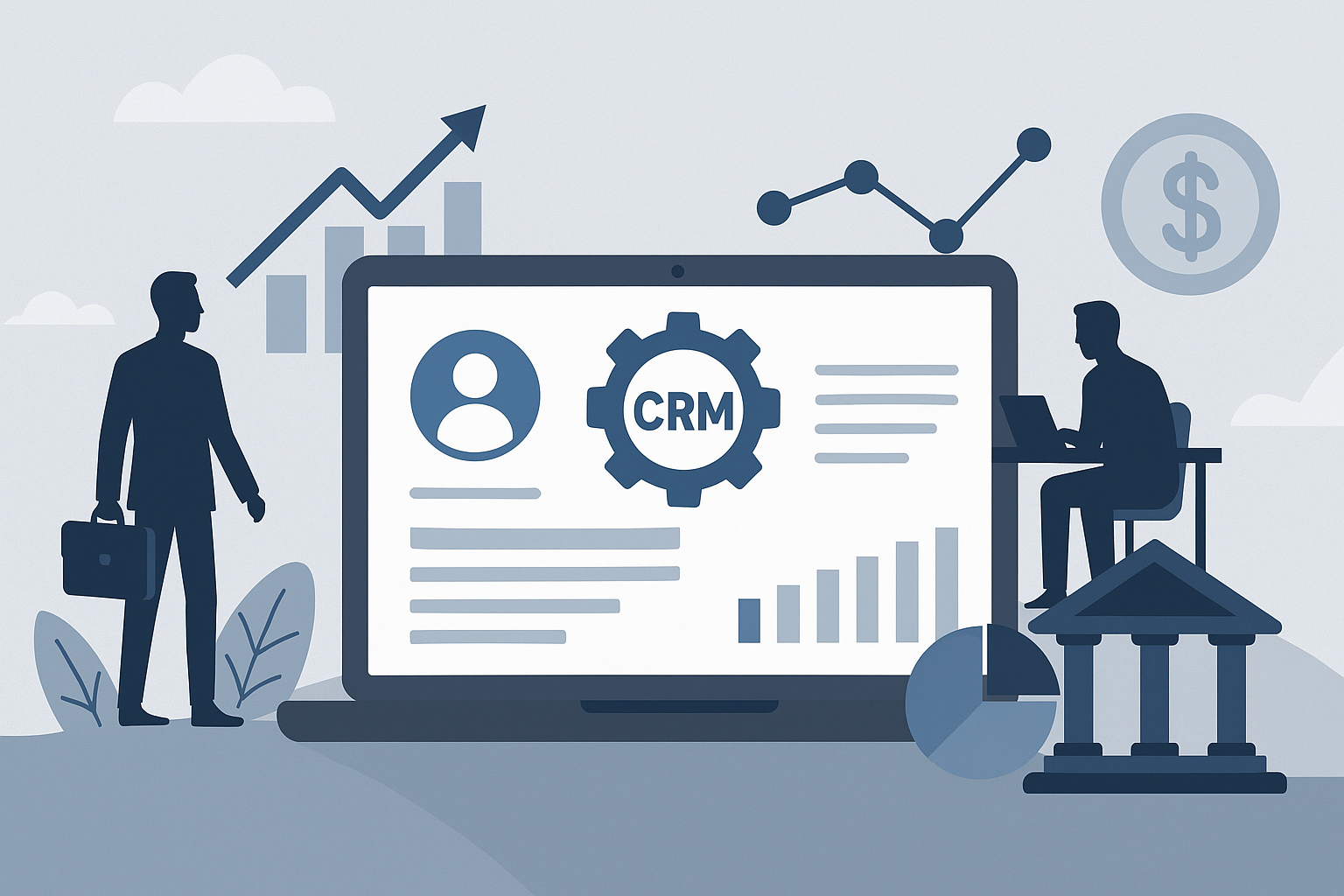The Role of CRM in Institutional Sales and Trading

In the high-speed world of institutional finance, managing relationships is just as critical as executing trades. As firms compete to deliver value, insights, and execution speed, maintaining client engagement and visibility across desks becomes increasingly complex.
CRM (customer relationship management) refers to the set of practices, methods, and technology that businesses employ to manage and analyze customer interactions and data across the customer lifecycle. The goal is to enhance customer service relationships, boost client retention, and increase income.
CRM systems collect client data from multiple channels and points of contact between the customer and the firm. These include the company's website, phone, live chat, direct mail, marketing materials, and social media pages.
CRM systems can also provide customer service representatives with detailed information on clients' personal information, purchase history, purchasing preferences, and issues.
That’s where a purpose-built institutional sales CRM comes into play.
Whether you’re on a trading desk, in sales coverage, or managing broker relationships, an advanced CRM system tailored for capital markets can transform how you manage accounts, streamline workflows, and generate revenue.
In this article, we explore the vital role of CRM in institutional sales and trading and why it’s no longer just a "nice-to-have," but a strategic asset.

What Is an Institutional Sales CRM?
An institutional sales CRM is a specialized customer relationship management system designed specifically for sales teams in the capital markets ecosystem.
CRM for financial services aims to improve interactions with present and new clients, retain current customers, and drive sales/revenue growth. CRM for financial services is a comprehensive solution that combines a variety of operations such as sales and marketing automation, customer support, contact management, analytics, and more.
These features enable financial service businesses to provide specialized financial solutions, anticipate clients' requirements more proactively, and consistently deliver great services.
Unlike generic CRMs, it goes beyond tracking calls and emails, it:
- Maps complex buy-side and sell-side relationships
- Tracks trade ideas, investment interests, and research consumption
- Facilitates coordination across sales, trading, and research desks
- Ensures compliance through interaction logging and audit trails
- Surfaces real-time engagement insights for decision-making
It’s the backbone of relationship-driven execution, where timing, trust, and transparency are key to winning and retaining institutional clients.
Limitations of Generic CRMs in Capital Markets
Generic CRM platforms like Salesforce or HubSpot are built for linear B2B sales funnels. But institutional sales are multi-dimensional:
- One account may involve multiple funds, PMs, traders, and analysts
- A single salesperson may cover multiple sectors, products, or geographies
- Conversations often span voice, email, chat, Bloomberg IM, and in-person meetings
- Traders and sales teams need to capture real-time market color and deal activity
A CRM that isn't purpose-built for trading desks lacks the speed, structure, and intelligence needed for institutional client servicing.
How InsightsCRM Elevates Institutional Sales
InsightsCRM is a next-gen CRM platform designed specifically for capital markets professionals. Built with input from sales, trading, and compliance teams, it offers:
- Multi-level account views (firm, fund, contact, strategy)
- Integrated call notes and meeting capture
- Automated research and trade idea workflows
- Cross-desk visibility and alerts for hot accounts
- Custom dashboards for sales heads, traders, and compliance
Whether you're a broker, salesperson, or trading desk head, InsightsCRM brings clarity, speed, and intelligence to your institutional coverage.
Benefits of Using CRM for Trading Desks and Sales Teams
Let’s look at the specific advantages of implementing a modern CRM for trading desks and institutional sales teams.
1. Client Coverage Intelligence
Institutional accounts are rarely managed by one person. A capital markets CRM helps map the full relationship:
- PMs, traders, analysts, and ops contacts
- Investment preferences and risk appetite
- Coverage notes and research interactions
- Call logs, meeting history, and event participation
With this, capital markets sales tools ensure that coverage teams never miss a beat, even when team members rotate.
2. Trade Idea and Research Distribution Tracking
In institutional sales, insight delivery is currency. CRMs help:
- Log and tag trade ideas by asset class, sector, and issuer
- Distribute notes to specific clients and track open/click rates
- Ensure compliance by marking material as "solicited" or "unsolicited."
- Measure idea uptake based on follow-up trades or feedback
This closes the loop between sales coverage and execution outcomes.
3. Seamless Sales & Trading Coordination
A CRM for institutional sales helps align front-office workflows:
- Share market commentary or desk color with traders in real-time
- Pass investor feedback from sales to trading in one click
- Track block trade conversations and IOIs in a structured format
- Enable pre-trade compliance and approval workflows
The result? Faster pricing, better execution, and tighter client relationships.
4. Enhanced Compliance and Audit Trails
As regulations tighten (e.g., MiFID II, FINRA, SEC), capturing interactions and recommendations is non-negotiable.
A modern CRM for brokers includes:
- Timestamped activity logs
- Role-based access controls
- Email and chat integration (Bloomberg, Outlook, and Microsoft Teams)
- Built-in compliance tagging and alerts
This protects the firm and increases transparency with regulators and clients.
5. Real-Time Dashboards and Analytics
A powerful institutional sales CRM provides actionable insights through:
These capital markets analytics inform resource allocation, identify at-risk accounts, and fuel data-driven growth.
CRM Features Institutional Sales Teams Should Demand
Not all CRM systems are created equal. Here's what institutional sales desks should look for:
- Sector-specific coverage views
- Contact-level relationship mapping
- Voice & email integration (Outlook, Bloomberg, Teams)
- Trade idea tracking and tagging
- Custom compliance workflows and pre-trade approvals
- Mobile-ready for client meetings and travel
- Real-time reporting and IC-ready dashboards
These and other features are available on platforms like InsightsCRM, which are designed specifically for the capital markets.
The Future: AI-Enhanced Capital Markets Sales Tools
Looking ahead, expect institutional CRMs to adopt:
- AI-generated meeting summaries
- Predictive engagement scores (Who’s most likely to trade?)
- Auto-tagging of notes for compliance and analytics
- Personalized research recommendations per client
- Voice-to-CRM note capture
These innovations will further enable institutional sales teams to scale smarter, serve better, and sell faster, with compliance built in.
Final Thoughts: From Documents to Decisions
In institutional sales and trading, relationships are everything—but they’re only as valuable as your ability to manage them at scale. Without a specialized CRM, coverage becomes inconsistent, feedback is lost, and opportunities are missed.
A purpose-built institutional sales CRM gives your team the tools they need to engage smarter, close faster, and grow stronger, while meeting rising regulatory and reporting demands.
Looking to streamline your sales desk operations, boost client engagement, and automate compliance? InsightsCRM empowers capital markets professionals with a fully integrated platform designed for real-world workflows. Explore Features or Book a Demo with our Experts today!
